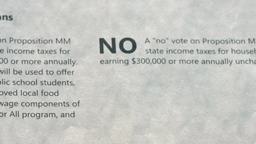DENVER — As ballots begin to arrive in Colorado mailboxes, another important piece of mail is ready to greet them: the 2025 Blue Book.
This year's book details two statewide ballot measures, the arguments for and against them, and what a "yes" and "no" votes mean.

The statewide ballot measures, Proposition LL and Proposition MM, were referred by the legislature and need a simple majority to pass.
Proposition LL aims to retain and spend excess state revenue collected from Proposition FF, also known as Healthy School Meals for All. Proposition FF, which was passed by Colorado voters in 2022, created a program that reimburses participating school meal providers offering free breakfast and lunch to all public school students. Schools must participate in the National School Lunch Program and receive federal meal funding to qualify.
Proposition LL would allow the state to use $12.4 million in excess tax revenue collected under Proposition FF for the Healthy School Meals for All Program, instead of refunding it to households that earn $300,000 or more a year. In addition, Proposition LL would maintain current tax deduction limits for households earning $300,000 or more annually, which are expected to be lowered next year.
A “yes” vote on Proposition LL allows the state to keep and spend $12.4 million in tax revenue that has already been collected for the Healthy School Meals for All Program and maintains current taxes on households earning $300,000 or more annually.
A “no” vote on Proposition LL means the state will refund $12.4 million to households earning $300,000 or more annually and allows deduction limits to change as scheduled under current law, which will lower taxes paid by these households.
So, why is Proposition LL on the ballot? The answer lies in the Taxpayer Bill of Rights (TABOR), which requires voter approval for the state to keep any revenue collected that exceeded a Blue Book estimate. In this instance, the 2022 Blue Book found that Proposition FF would increase tax revenue by $100.7 million in the 2023-24 budget year. The state ended up collecting $112 million, roughly $11.3 million more than expected, according to the Blue Book.
If Proposition LL does not pass, the $11.3 million excess, plus the $1.1 million in interest, would be refunded to households making $300,000 or more a year. In addition, the amount of taxes those households pay would be reduced in the future, as the current law requires under TABOR.
The Blue Book summarizes the arguments in support of Proposition LL as follows:
Proposition LL allows the state to retain revenue that it has already collected to support free school meals for public school students, rather than refunding it to high-income taxpayers. Access to free school meals improves academic outcomes, eliminates stigma for low-income students, and reduces hunger. Using all of the tax revenue the state has already collected will help provide more free school meals to Colorado public school students.
The argument against Proposition LL in the Blue Book is:
Proposition LL is effectively a tax increase in challenging economic times. The state collected more revenue than it estimated. It should refund the money to affected taxpayers rather than using it for a government program that gives meals to students even if their families can afford to pay for them.

Proposition MM would increase state income taxes for households that earn $300,000 or more a year in order to provide funding for the Healthy School Meals for All Program and the Supplemental Nutrition Assistance Program (SNAP).
Recent federal policy will increase SNAP costs paid by the state. The Blue Book states that Proposition MM would raise an additional $95 million in tax year 2026 and "similar amounts in future years."
A “yes” vote on Proposition MM increases state income taxes for households earning $300,000 or more annually. The increased tax revenue will be used to offer free school meals to all public school students, implement previously approved local food purchasing and employee wage components of the Healthy School Meals for All program, and help fund SNAP.
A “no” vote on Proposition MM keeps state income taxes for households earning $300,000 or more annually unchanged.
There are two arguments detailed within the Blue Book on either side of Proposition MM.
Arguments in support of Proposition MM:
1) Proposition MM ensures that free school meals are available to all Colorado students. The Healthy School Meals for All Program has been more highly utilized than anticipated, demonstrating the strong need for a universal free school meal program. Access to free school meals improves academic and health outcomes and helps families at a time when food costs are rising and federal assistance is declining. When fully implemented, the program also provides students with locally sourced, healthy food and boosts compensation for school meal workers in Colorado communities.
2) Many Colorado families and individuals rely on SNAP for some or all of their food needs. SNAP improves health, economic, and educational outcomes for low-income families. The funding provided by the measure will lessen the impact of recent federal cuts to the program and allow the state to continue important food assistance and nutrition education programs.
Arguments against Proposition MM:
1) Proposition MM gives more taxpayer money to excessive government programs. The school meals program provides food to kids who do not need it or eat it, wasting both money and food. Federal changes are meant to make SNAP more cost-effective, and state taxpayers should not be on the hook for funding the program’s inefficiencies. The state should live within its means and provide assistance to only those who need it most, rather than asking for millions more from taxpayers.
2) Proposition MM is a tax increase. For many households, this would more than double the amount they have to pay, a significant additional expense. The state should not be raising taxes on any households during a time of economic uncertainty.
Election day is Tuesday, Nov. 4. Ballots are being mailed to registered voters in Colorado until Oct. 17.







